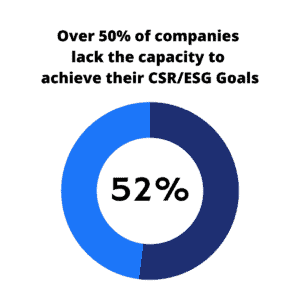Why Your ESG Report Needs a Narrative, The Writing Company
(Blog)
ESG reports are typically based on reams of data. But companies should pay equal attention to their ESG narrative, which connects the dots between their ESG values and their business.
By Michaela Cavallaro, executive editor, The Writing Company
For many people tasked with overseeing a corporate ESG report, the first concern is data — how to gather it, ensure it’s accurate, compare it to competitors’ and to industry standards, and support it with the appropriate context. These are all important considerations. But many ESG reports could benefit from similar attention to narrative — your organization’s ESG story.
An ESG report is an opportunity to tell a story about your company. Ideally, that story connects the dots between your ESG activities and your business, showing how progress on ESG enhances the organization’s business value.
For that reason, it’s best to set aside some time early in your reporting process — and certainly well before writing begins — to define your ESG narrative. You might start by thinking of it as an elevator pitch for your company’s approach to ESG. The narrative doesn’t have to be elaborate or complex; in fact, it’s probably better if it’s not. We’ve worked with clients whose narratives are as simple as “our ESG strategy helps ensure we deliver on our corporate vision.”
As you develop the report, the narrative serves as an organizing principle: Do wastewater treatment numbers demonstrate how we’re delivering on our corporate vision? If so, they should be included in the body of the report, not just tucked away in an index or appendix — and the copy accompanying them should make that impact clear. With a clear ESG narrative, even the driest material — like details about cybersecurity policies or compliance procedures — can support and advance your most important messages.
Meeting readers’ needs
A data-first approach to ESG reporting may be appropriate in some cases, but companies should be aware of the implications. A “just the facts” approach, heavy on charts and tables, sends the message that you’re simply reporting what you have to, whether because of regulatory requirements or pressure from stakeholders. This type of report will meet the needs of the investors and analysts who use CTRL-F to search for specific figures, standards or commitments. However, it only provides a limited view of your company’s ESG story.
A narrative approach offers the opportunity to bring in more voices from your organization, who can tell deeper stories about what the numbers mean. They can also show what your approach to ESG looks like in real life — a message that may be particularly compelling to current and prospective employees, community partners and vendors. These readers may skim casually, looking for images, headlines or topics that catch their attention.
To draw them in and deepen your ESG report, we recommend supporting the facts and figures with:
Case studies and sidebars that show your ESG priorities in action – items such as a case study of a weatherization project, a profile of a new talent development program or a “by the numbers” look at data on employee participation in volunteer efforts.
High-quality photography. Some use of stock photos may be unavoidable, but when possible, supplement them with current snapshots of real people and places in your organization.
Compelling pull quotes that provide a personal point of view on your company’s ESG-related activities and align with your narrative. Pre-written quotes from top leadership are a given in many reports; if possible, add lightly edited quotes from live interviews with employees or community partners.
Publishing an ESG report takes enormous time and resources. Building your report around a strong narrative helps make the most of that investment, ensuring that readers come away with a full understanding of how your ESG program enhances your company’s value.
Contact Michaela
Michaela Cavallaro
michaela@thewritingcompany.com





